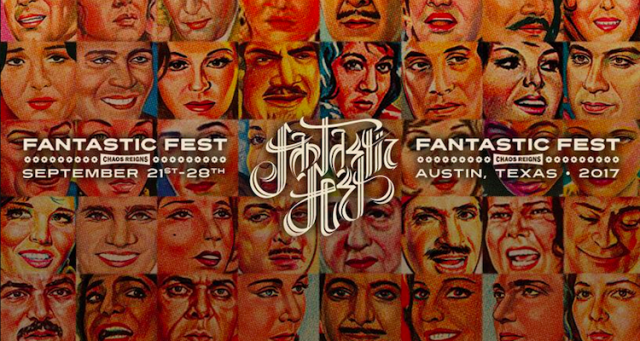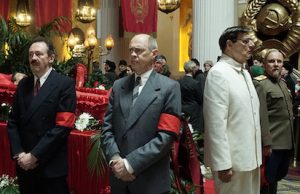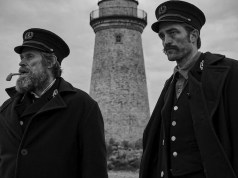
We’ll talk about the behind-the-scenes turmoil at Fantastic Fest in another wordpile. In the meantime, here are reviews of some of the notable films that played there. They don’t have U.S. release dates yet (except as noted), but we’ll let you know when they do.
Tigers Are Not Afraid
 A tough, beautiful urban fairy tale by Mexican writer-director Issa López, Tigers Are Not Afraid is a perfect example of how genre films can help us engage with real-world crises without being overwhelmed or discouraged by them. It’s set in an unnamed Mexican metropolis from which thousands of men, women, and children have disappeared since the start of the drug war in 2006, with young Estrella (Paola Lara) coming home from school one day to find that her mother is now among them. Reassuring herself with a running fantasy about the courage of tigers and the belief that people have inherent value that gets lost when they’re afraid (“We forget who we are when the things from outside come to get us”), Estrella joins forces with a quartet of younger street boys, led by El Shine (Juan Ramon López), who have stolen an iPhone and a gun from a drug dealer who wants them back at all costs. What separates this from other stories about people running afoul of drug lords isn’t just that it’s about children, but that López presents them as children, brimming with imagination and playfulness even while negotiating for their lives. The kids are irresistibly lovable, and while López uses magical realism (graffiti that comes to life; a trail of blood that leads Estrella around) to soften the blow, she doesn’t shy away from the brutal realities. I’ve seldom seen such lyrical poignance in such a sad setting. Grade: A-
A tough, beautiful urban fairy tale by Mexican writer-director Issa López, Tigers Are Not Afraid is a perfect example of how genre films can help us engage with real-world crises without being overwhelmed or discouraged by them. It’s set in an unnamed Mexican metropolis from which thousands of men, women, and children have disappeared since the start of the drug war in 2006, with young Estrella (Paola Lara) coming home from school one day to find that her mother is now among them. Reassuring herself with a running fantasy about the courage of tigers and the belief that people have inherent value that gets lost when they’re afraid (“We forget who we are when the things from outside come to get us”), Estrella joins forces with a quartet of younger street boys, led by El Shine (Juan Ramon López), who have stolen an iPhone and a gun from a drug dealer who wants them back at all costs. What separates this from other stories about people running afoul of drug lords isn’t just that it’s about children, but that López presents them as children, brimming with imagination and playfulness even while negotiating for their lives. The kids are irresistibly lovable, and while López uses magical realism (graffiti that comes to life; a trail of blood that leads Estrella around) to soften the blow, she doesn’t shy away from the brutal realities. I’ve seldom seen such lyrical poignance in such a sad setting. Grade: A-
Bodied
 My understanding of battle rap — informed entirely by Joseph Kahn’s Bodied, a devastatingly funny social commentary — is that it’s like a no-holds-barred comedy roast except the jokes have to rhyme, with participants insulting each other in loosely metered couplets that may be improvised or prepared. Bodied (slang for killed or defeated) examines this subsection of hip-hop culture through the eyes of a white graduate student, Adam (Calum Worthy), who’s writing his thesis on it and ends up becoming a participant after interviewing battle-rap champion Behn Grymm (Jackie Long) — much to the dismay of his own shrill, scolding girlfriend, Maya (Rory Uphold), who’s offended by the content of the un-P.C. raps and by the very idea of a white suburban kid being involved. Kahn structures the story like a sports movie, culminating in an electrifying showdown between mentor and protege that is at least as exciting as any actual sports movie I’ve watched. But even better, he uses the scenario to crack open and satirize an impressive number of hot-button topics — racism, misogyny, homophobia, cultural appropriation, who can say the N-word, fake outrage from outsiders, the liberal game of calling out other liberals for not being woke enough — AND to discuss the mechanics of brainstorming and joke-writing. Kahn’s writing style, where people don’t have conversations so much as take turns making overwritten pronouncements, requires some adjustment, but it fits the broadly satiric tone and intentionally stereotypical characters. Despite a few comedic misfires (inevitable in a film this densely packed), it’s an explosively funny snapshot of American culture in 2017. Grade: A-
My understanding of battle rap — informed entirely by Joseph Kahn’s Bodied, a devastatingly funny social commentary — is that it’s like a no-holds-barred comedy roast except the jokes have to rhyme, with participants insulting each other in loosely metered couplets that may be improvised or prepared. Bodied (slang for killed or defeated) examines this subsection of hip-hop culture through the eyes of a white graduate student, Adam (Calum Worthy), who’s writing his thesis on it and ends up becoming a participant after interviewing battle-rap champion Behn Grymm (Jackie Long) — much to the dismay of his own shrill, scolding girlfriend, Maya (Rory Uphold), who’s offended by the content of the un-P.C. raps and by the very idea of a white suburban kid being involved. Kahn structures the story like a sports movie, culminating in an electrifying showdown between mentor and protege that is at least as exciting as any actual sports movie I’ve watched. But even better, he uses the scenario to crack open and satirize an impressive number of hot-button topics — racism, misogyny, homophobia, cultural appropriation, who can say the N-word, fake outrage from outsiders, the liberal game of calling out other liberals for not being woke enough — AND to discuss the mechanics of brainstorming and joke-writing. Kahn’s writing style, where people don’t have conversations so much as take turns making overwritten pronouncements, requires some adjustment, but it fits the broadly satiric tone and intentionally stereotypical characters. Despite a few comedic misfires (inevitable in a film this densely packed), it’s an explosively funny snapshot of American culture in 2017. Grade: A-
The Death of Stalin
 Armando Iannucci has written and directed two films in his career, and they’re both among the best political comedies ever made. First there was In the Loop, an extension of his British TV series The Thick of It (he also created HBO’s Veep) that used fictional U.K. and U.S. functionaries to satirize our two nations’ political dysfunction and eagerness for war. Now he returns (with co-writers David Schneider and Ian Martin) with The Death of Stalin, a breathtakingly dark comedy of errors that holds up the brutal Soviet dictator’s final days as a mirror to current British and American quagmires. The fictionalized plot, which hardly exaggerates the truth, comes from a French graphic novel; Iannucci and company have added comedy to it, replaying horrific events as farce, turning everyone into bumblers, and finding grim laughs in the minutiae of Stalin’s reign of terror. (“Don’t worry!” says the Radio Moscow director cheerily to the audience he’s hastily assembling at Stalin’s command. “Nobody’s going to get killed!”) The masterstroke, however, is in the casting and the decision to have everyone speak in their native accents. So here’s Steve Buscemi as Nikita Khrushchev, a loud buffoon and sycophant who keeps track of which of his jokes get the best laughs; Jeffrey Tambor as Georgy Malenkov, Stalin’s gullible successor (he weeps hilariously at the sight of Dear Leader incapacitated) whose idiocy makes him useful; Simon Russell Beale as Lavrentiy Beria, a Cheney-like opportunist; Michael Palin as Vyacheslav Molotov, a clueless bureaucrat who was on Stalin’s to-kill list; Jason Isaacs as Georgy Zhukov, swaggering military commander; Rupert Friend as Stalin’s raving conspiracy-theorist son. True to form, Iannucci packs the dialogue with profane insults (it’s the sort of movie where someone shouts obscenities at the burning corpse of a political enemy), but he also performs a delicate tight-rope act, conjuring thoughts of Brexit and Trump without laying it on too thick and mocking political connivers of all stripes with elegant savagery. Grade: A-
Armando Iannucci has written and directed two films in his career, and they’re both among the best political comedies ever made. First there was In the Loop, an extension of his British TV series The Thick of It (he also created HBO’s Veep) that used fictional U.K. and U.S. functionaries to satirize our two nations’ political dysfunction and eagerness for war. Now he returns (with co-writers David Schneider and Ian Martin) with The Death of Stalin, a breathtakingly dark comedy of errors that holds up the brutal Soviet dictator’s final days as a mirror to current British and American quagmires. The fictionalized plot, which hardly exaggerates the truth, comes from a French graphic novel; Iannucci and company have added comedy to it, replaying horrific events as farce, turning everyone into bumblers, and finding grim laughs in the minutiae of Stalin’s reign of terror. (“Don’t worry!” says the Radio Moscow director cheerily to the audience he’s hastily assembling at Stalin’s command. “Nobody’s going to get killed!”) The masterstroke, however, is in the casting and the decision to have everyone speak in their native accents. So here’s Steve Buscemi as Nikita Khrushchev, a loud buffoon and sycophant who keeps track of which of his jokes get the best laughs; Jeffrey Tambor as Georgy Malenkov, Stalin’s gullible successor (he weeps hilariously at the sight of Dear Leader incapacitated) whose idiocy makes him useful; Simon Russell Beale as Lavrentiy Beria, a Cheney-like opportunist; Michael Palin as Vyacheslav Molotov, a clueless bureaucrat who was on Stalin’s to-kill list; Jason Isaacs as Georgy Zhukov, swaggering military commander; Rupert Friend as Stalin’s raving conspiracy-theorist son. True to form, Iannucci packs the dialogue with profane insults (it’s the sort of movie where someone shouts obscenities at the burning corpse of a political enemy), but he also performs a delicate tight-rope act, conjuring thoughts of Brexit and Trump without laying it on too thick and mocking political connivers of all stripes with elegant savagery. Grade: A-
Seven more reviews at Crooked Marquee




